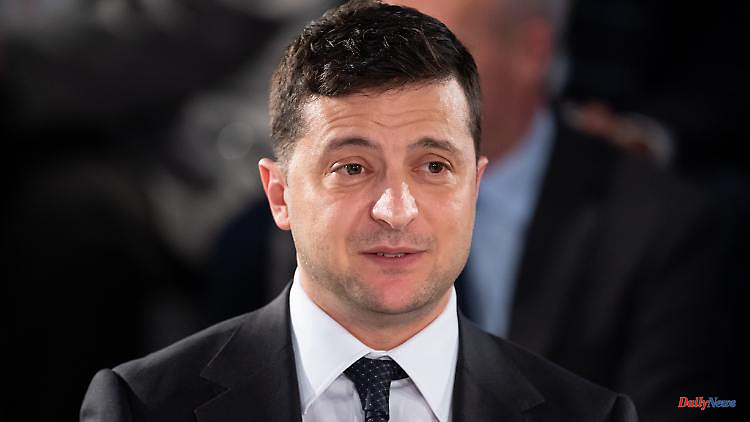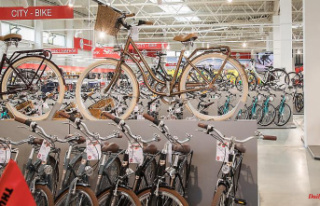Polish journalist Wojciech Rogacin has written a biography of Ukrainian President Volodymyr Zelenskyy. "He became the leader for the Ukrainians, but he also fights for the entire free world," says Rogacin in an interview with ntv.de.
Polish journalist Wojciech Rogacin has written a biography of Ukrainian President Volodymyr Zelenskyy. "He became the leader for the Ukrainians, but he also fights for the entire free world," says Rogacin in an interview with ntv.de. His book describes how an actor became president and a president became a hero. "Ukrainians I spoke to for the book told me that overnight they felt like they had a leader - an ataman, as the Cossacks called their military leaders," Rogacin said.
ntv.de: Your book was published in Poland in May. When did you start writing?
Wojciech Rogacin: When the war started. I've been a journalist for more than 30 years, most of that time I've dealt with international issues, especially with the states that emerged when the Soviet Union collapsed, including Ukraine. Zelenskyj has interested me for years. When the war started, he became a hero - not just for Ukrainians, but for people in general who oppose Russian imperialism, who oppose war in today's Europe. He was a hero when he told the Americans that what he needed was ammunition, not a ride. For the Ukrainians he became the leader, but he also fights for the entire free world. Colleagues of mine in Poland hung his picture in their offices after the start of the war. I had the feeling that this man should be presented more intensively, how he became a politician and how he has grown in his role.
They call Zelenskyy a leader. The German translation of your book speaks of a "leader" - for obvious reasons the word "leader" is compromised in German. What makes a leader?
A leader is a person who leads a group, in this case a nation, a society, towards a common goal, even if it is difficult to achieve. Zelenskyy could have left Ukraine, after all he was and is the main target for the Russian mercenaries, he and his family. But he stayed. Ukrainians I spoke for the book told me that overnight they felt like they had a leader - an ataman, as the Cossacks called their military leaders. Because he stayed with them, because he shares the threat, the goals and dreams of the whole nation.
After his election as president, Zelenskyy wanted to reach an agreement with Russia, which was one of his most important campaign promises. Why didn't that work?
When Zelenskyj became president in 2019, he was still quite naive. He wasn't a politician when he ran for the presidency, he was an actor, an entertainer, a comedian, as some call him. He was naïve when it came to Putin, the Kremlin and Russian politics. During the election campaign, he had promised the Ukrainians to solve the problem in eastern Ukraine: the Russian invasion of eastern Ukraine and the annexation of Crimea. He said he will speak to Putin and negotiate an agreement where they meet somewhere in the middle.
But?
Putin was not interested in an agreement. He may have thought it would be easy to outmaneuver Zelenskyy. Firstly because he was not an experienced politician, but also because he comes from eastern Ukraine, where people speak Russian and had closer ties to Russia. A few years later, when Putin understood that he could not achieve his goals, he decided on a full-scale invasion, on a big war against Ukraine. The fact that Selenskyj did not manage to bring about an understanding with Russia was not due to his naivety. It was because Putin is who he is.
Then Ukraine or the West could not have prevented this war?
In my opinion, this war could have been prevented after 2014, after the annexation of Crimea and the Russian invasion of eastern Ukraine. After all, the Russian war against Ukraine had already begun back then. Since then there have been deaths on the border between unoccupied Ukraine and the so-called People's Republics. Too many failed to take this threat seriously, failing to see that Putin wanted to take control of all of Ukraine, either through a puppet regime in Kyiv or through other means. With the Minsk agreements, the West gave Putin so much leeway that he kept demanding more. Western countries should have reacted much more harshly at the time.
US President Joe Biden said in June that Zelenskyy had ignored US warnings of a Russian invasion shortly before the war began. Do you think so?
I dont know. I spoke to Polish President Andrzej Duda, who is now a friend of Zelenskyj, and he told me that months before the war, both he and Zelenskyj received intelligence from the US that the invasion was imminent. So you knew. So I found it odd that Biden said that. Maybe he meant the days just before the attack. Zelenskyy did not make a speech to his people, urging them to prepare for an attack, he did not call on women and children to leave the country. Rather, his message was: don't panic. I spoke to Ukrainians who accuse him and his government of doing this. But I assume Zelenskyj didn't want to spread panic.
He said so explicitly at the security conference in Munich.
And at the same time he tried to get as much support as possible from abroad and to prepare the army for war.
Zelenskyj's years as an actor are occasionally mentioned to suggest that his videos and speeches are mostly staging. They cite a 2018 interview in which Zelenskyy said he knew "why an actor asks a certain question and how it's received by the audience." Is Zelenskyj's communication manipulative?
I would not say that. Yes, he is an actor and he is a very good speaker. He's also very good at engaging with his audience. But if politicians are good speakers, then they are not manipulative. They simply use the tools at their disposal to communicate with voters.
There is a similarity between Zelenskyi and Wassyl Holoborodko, the character he embodied in his television series "Servant of the People": As politicians, both surrounded themselves with people they knew privately. In the case of Selenskyj, it was colleagues from his production company Kwartal 95. Isn't that a form of nepotism?
His critics in Ukraine accused him of that. Zelenskyi had promised to crack down on nepotism, and when he took office he brought around 30 people from his company with him. I don't think that's nepotism, I think there were other reasons. First of all, the group meant a lot to him, some of whom he has worked with since his student days. When a major Moscow production company made him an offer in 2003, he turned it down on the condition that he leave Kvartal 95. He once said that he saw that as a betrayal. I think he wanted these people around as President because he was comfortable with them. Zelenskyj is someone who makes decisions in a group. He says a person isn't the alpha and the omega, he doesn't have a clue about everything himself. He needs people around him who help him, but who he must also be able to trust.
They describe how the lawyer Andriy Bohdan in 2016 at a meeting in Odessa gave Zelenskyy the idea to run for the presidency. If this were a scene from the series "Servants of the People", wouldn't the audience think that Holoborodko can now be bought after all?
You mean because Bohdan was the lawyer of the oligarch Ihor Kolomoiskyi?
And.
I think things are more complicated. At that time, Zelenskyy was working for the Ukrainian TV channel 1 1, which is still owned by Kolomoyskyy. But all TV channels in Ukraine are owned by oligarchs. After Zelenskyi became president, he cut ties with Kolomoiskyi. Two years after his election, he signed an anti-oligarch law. In any case, he is definitely not a puppet of Kolomojskyj.
In Germany, Selenskyj is not always viewed positively, there are people who accuse him of not stopping provoking, or others who he simply gets on their nerves. How is it in Poland?
You don't hear that kind of criticism in Poland. The Poles show a lot of sympathy for Ukraine - for the refugees and for the country. I can't imagine anyone in Poland accusing Zelenskyi of provoking Putin. That would also be absurd: Putin does not need provocations to pursue his imperialist goals. If necessary, he creates his own provocations. That's how it was when he attacked Georgia in 2008. It is the same now. The Russians do not commit war crimes in Bucha and elsewhere because they were provoked. They are destroying one Ukrainian city after another, bombing civilian targets like theaters and shopping malls. To say that there is a Ukrainian provocation here is entirely in line with Russian propaganda.
Do people in Poland follow the German debate about Ukraine policy and what the Chancellor is doing or not doing?
Oh yeah. The general perception is that Chancellor Scholz does not support Ukraine strongly enough that he says one thing and does another. I would say that is the unanimous opinion of the Polish media, Polish public and Polish politicians.
Olaf Scholz is only mentioned twice in your book, both times only in passing. How do you rate his Ukraine policy?
My opinion corresponds to the attitude of the Polish public. He is a politician and thinks about what is best for himself. In my view, however, the best thing would be to stop Russian imperialism. Not only Germany, but also countries like France and Italy should do more here and be tougher on Russia. If Putin is not stopped in Ukraine, he will move on in a few years. And if he doesn't exist anymore, someone else will do it, because there are enough people around him who think like him. One of Zelenskyy's advisers said, cynical as it is, it would be cheaper for the West to send weapons to Ukraine now than to have to fight Putin itself in a few years.
With Wojciech Prayer Language Hubertus Volmer












